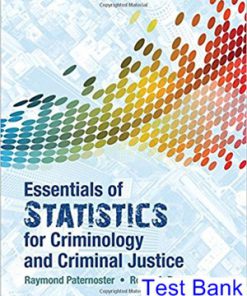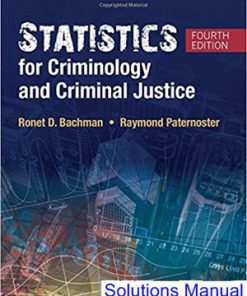Fundamentals of Research in Criminology and Criminal Justice 4th Edition Bachman Test Bank
$26.50$50.00 (-47%)
Fundamentals of Research in Criminology and Criminal Justice 4th Edition Bachman Test Bank.
You may also like
Fundamentals of Research in Criminology and Criminal Justice 4th Edition Bachman Test Bank

Product details:
- ISBN-10 : 1506359574
- ISBN-13 : 978-1506359571
- Author: Ronet D. Bachman, PhD
Fundamentals of Research in Criminology and Criminal Justice, Fourth Edition introduces students to the multifaceted subject of research methods and shows them why research is important in the field of criminology and criminal justice. This brief version of Ronet Bachman and Russell K. Schutt’s successful textbook (The Practice of Research in Criminology and Criminal Justice) simplifies complex concepts with real-world research examples found in everyday experiences in the criminology and criminal justice professions.
The thoroughly updated Fourth Edition of this bestseller reflects the most recent developments in research methods, including the use of big data, increased coverage of crime mapping, evidence-based and web-based research, along with the most current research examples impacting the field. This is an excellent introductory text for undergraduate research courses, and is ideal for students who want to understand how and why criminal justice research is done to become critical consumers of research.
Table contents:
1. Science, Society, and Criminological Research
What Do We Have in Mind?
Reasoning About the Social World
How the Scientific Approach Is Different
Social Research Philosophies
Quantitative and Qualitative Methods
Specific Types of Research Methods
Strengths and Limitations of Social Research
Conclusion
Key Terms
Highlights
Exercises
2. The Process and Problems of Criminological Research
What Do We Have in Mind?
Criminological Research Questions
The Role of Theory
Social Research Strategies
A History of Investigating the Effects of Arrest for Intimate Partner Violence: The Research Circle in Action
Guidelines for Criminologists
Social Research Standards
Conclusion
Key Terms
Highlights
Exercises
3. Research Ethics
What Do We Have in Mind?
Historical Background
Ethical Principles
Research Involving Special Populations: Children and Prisoners
Conclusion
Key Terms
Highlights
Exercises
4. Conceptualization and Measurement
What Do We Have in Mind?
Concepts
Concepts and Variables
How Will We Know When We’ve Found It?
How Much Information Do We Really Have?
Did We Measure What We Wanted to Measure?
Conclusion
Key Terms
Highlights
Exercises
5. Sampling
What Do We Have in Mind?
Sample Planning
Sampling Methods
Units of Analysis and Errors in Causal Reasoning
Conclusion
Key Terms
Highlights
Exercises
6. Causation and Experimentation
What Do We Mean by Causation?
Causal Explanation
Criteria for Nomothetic Causal Explanations
Why Experiment?
What If a True Experiment Isn’t Possible?
What Are the Threats to Internal Validity and Generalizability in Experiments?
The Element of Time in Research
Causality in Nonexperimental Designs
How Do Experimenters Protect Their Subjects?
Conclusion
Key Terms
Highlights
Exercises
7. Survey Research
Survey Research in Action: Measuring Victimization
What Is a Survey?
Questionnaire Development and Assessment
Writing Survey Questions: More Difficult Than You Think!
Organization Matters
Survey Designs
Ethical Issues in Survey Research
Conclusion
Key Terms
Highlights
Exercises
8. Qualitative Methods and Data Analysis
What Do We Mean by Qualitative Methods?
Fundamentals of Qualitative Methods
Participant Observation
Systematic Observation
Intensive Interviewing
Focus Groups
Analyzing Qualitative Data
Techniques of Qualitative Data Analysis
Alternatives in Qualitative Data Analysis
Computer-Assisted Qualitative Data Analysis
Ethical Issues in Qualitative Research
Who Owns the Qualitative Data?
Conclusion
Key Terms
Highlights
Exercises
9. Analyzing Content: Secondary Data Analysis, Comparative Methods, Content Analysis, Crime Mapping, and Big Data
What Are Secondary Data?
Comparative Methods
Content Analysis
Crime Mapping
Big Data
Methodological Issues When Using Secondary Data
Ethical Issues When Analyzing Available Data and Content
Conclusion
Key Terms
Highlights
Exercises
10. Evaluation and Policy Analysis
A Brief History of Evaluation Research
Evaluation Basics
Evaluation Alternatives
Design Decisions
Evaluation in Action
Strengths of Randomized Experimental Designs in Impact Evaluations
When Experiments Are Not Feasible
Qualitative and Quantitative Methods
Ethics in Evaluation
Conclusion
Key Terms
Highlights
Exercises
11. Mixing and Comparing Methods
What We Have in Mind
What Are Mixed Methods?
Strengths and Limitations of Mixed Methods
Comparing Results Across Studies
Ethics and Mixed Methods
Conclusion
Key Terms
Highlights
Exercises
12. Reporting Research Results
Research Report Goals
Types of Research Reports
Curbing the Frustrations of Writing
Displaying Data
Some Final Thoughts on Reporting Quantitative and Qualitative Research
Ethics, Politics, and Reporting Research
Communicating With the Public
Plagiarism
Conclusion
Key Terms
Highlights
Exercises
Appendix A. Conducting Literature Reviews and Finding Information
Appendix B. How to Read a Research Article
Appendix C. How to Use a Statistical Package: SPSS
Appendix D. How to Use a Qualitative Analysis Package
Appendix E. How to Use a Data Spreadsheet: Excel
Appendix F. Conducting Descriptive Quantitative Data Analysis
Appendix G. Data Sets
Glossary
References
Index
People also search:
fundamentals of research in criminology and criminal justice 4th edition
fundamentals of research in criminology and criminal justice
4 purposes of research in criminal justice
functions of criminology
basic features of criminology












